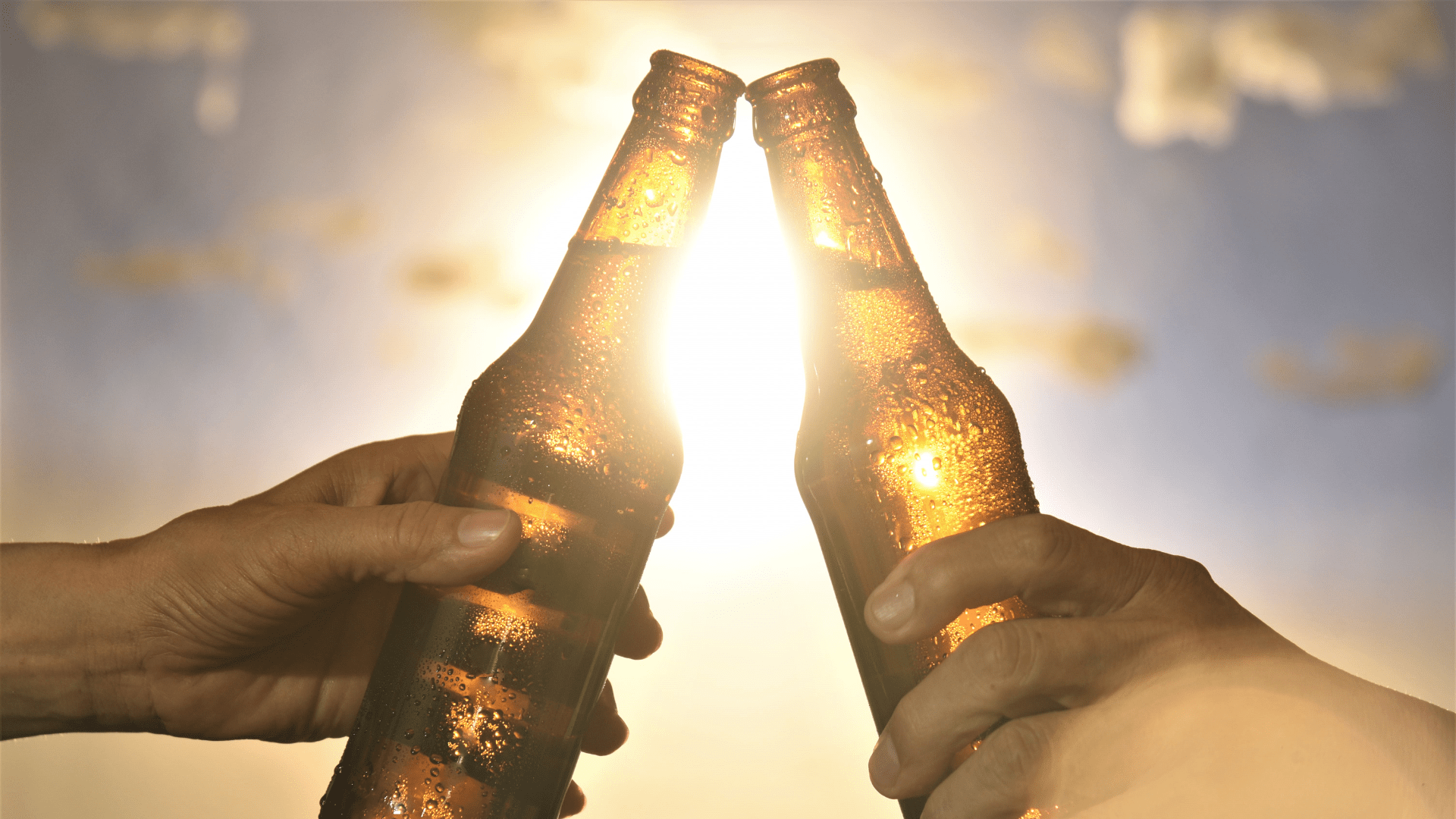
Why does beer taste better in glass?
Whether it’s cracking open a cold lager to cool down on a summer day or enjoying a carefully crafted bottle of ale in the local bar, we bet that when it comes to planning your next beer, you're thinking about glass. But why is it that we enjoy beer better when it comes in glass? In this article we'll not only explain to you why your favourite drink tastes different in glass, but also how you can store your beer at home for the best experience.
Reasons why beer is better in glass
Natural, inside and out
Beer is made from natural ingredients – and so is glass. Made of sand, soda ash, limestone and recycled glass (cullet), there’s no need for any additional synthetic liners, and no risk of harmful chemicals getting into your drink. It protects the quality and preserves the taste of your drink, letting you enjoy it just as it was intended by the brewer.
Besides being made from natural ingredients, glass bottles are endlessly recyclable and returnable dozens of times, which facilitates circularity and conscious consumption. Every time you bring your empty container to the bottle bank, it will be on its way to be recycled into a new bottle or jar, ready to store your next drink, food or cosmetics product.
Preventing oxidation and staling
Taste preservation and quality are considered the most important reasons for consumers to buy beer in glass bottles. But how do bottles protect the taste?
Simply put, they ensure that your favourite ale, lager or IPA doesn’t go stale. Glass acts as an effective barrier against external influences. This prevents the aromas from escaping while shielding your drink from interacting with oxygen. It’s this interaction with oxygen that can make your drink go stale.
Protects against light exposure
But not only can beers go stale, they can also get ‘skunky’. Ask any craft brewer and they’ll tell you this happens when the hop in beer gets ‘light-struck,’ in other words when it’s exposed to too much light. When hit with sunlight, the sensitive hops compounds break down and mix with the proteins, releasing an unpleasant smell.
Thankfully, an amber bottle can provide even 99.9% protection from UV rays. That’s why so many specially crafted brews come in brown or amber bottles, retaining their top-notch flavour for months on end.
It’s safe and inert
As glass is natural and inert, it prevents any transfer of flavours into or from the beer. It’s a single-layered material which doesn’t require any chemical liners that could interact with the beverages. The quality of the packaging also remains the same, no matter how many times it is recycled, making it the most stable packaging material.
Stylish design
Glass is pure quality, crafted to perfection – just like our favourite beers. Looking beyond the label, the bottles allow for special brews and pints to be packaged in a variety of shapes, sizes and colours – leading to unique, eye-catching designs that match the originality of the brew and the brand.
That’s what adds to the thrill for many beer lovers who collect and display their favourite bottles from around the world at home. We’re particularly impressed by the efforts of American collector Rob Werner, who holds the Guinness World Record for the largest collection of beer bottles in the world, at an impressive 42,645 bottles and rising – setting the standard for us all!
![two guys next to shelves with beer bottle collection]()
Experience of drinking
Glass is one of the few packaging materials that can stir an emotional connection and transform any event, large or small, into a real celebration.
Bottles are the perfect choice, not just for everyday craft beer experiences, but also special occasions. Major moments in our lives, from birthdays to celebrating personal accomplishments, wouldn’t be the same without the sound of two bottles “clinking” together to mark the moments that matter. That’s what makes glass a material like no other, and why we chose to celebrate it in the International Year of Glass.
How do bottles compare to other packaging materials?
So, we know that glass preserves a carefully crafted brew’s aroma and authentic taste, while maintaining its freshness and carbonation for longer. But what about other packaging materials? Does beer taste different in glass, compared to plastic or cans?
Plastic
Based on scientific research, plastic isn’t as effective at preventing oxidation and stalling as glass. Using plastic bottles can affect the quality of the drink, as the structure of most plastics is less effective at retaining carbonation and preventing oxidation.
According to Brewers Association’s Chuck Skypeck, using plastic can even make your ale, stout or lager go ‘skunky’ as plastic bottles can’t adequately protect drinks from heat and sunlight exposure
Cans
Many people wonder how aluminium cans rate as an alternative to glass. Some researchers took it to the test and assessed whether people preferred bottled or canned beers.
They discovered that 61% of people prefer to drink beer from bottle, while only 11% prefer to drink it from a can. When asked, participants rated the drink poured from a bottle as tasting better than from a can. They also agreed that glass bottles stay colder longer – with 53% of beer lovers confirming it.
Besides, when having people over for dinner or a celebration, would you rather set the table filled with cans, or with finely designed bottles? Most people would never buy their beer for a special event in any packaging other than glass– and we couldn’t agree more!
“Packaging is very important on the way the beer tastes and the way it looks. […] For me, as an advocate for beer, the shape of glassware can definitely affect the taste and drinking experience of the beer.”
Jane Peyton, Beer Sommelier
How to store beer at home
As much as we wish it could, the flavour of your favourite lager, stout or IPA doesn’t last forever. As soon as it is made, the aging process starts. The taste and aroma of the hops deteriorate over time and with exposure to air, light, or warm temperatures. So, how can you ensure that your pint or ale tastes just as good later?
For most beers, the best way to extend their lifespan is to refrigerate them as soon as possible after you’ve bought them. For most beers…
![different beer bottles on shelves in store]()
Alcohol by Volume (ABV)
It’s important to know what you’re drinking. A first step to differentiate is to look at the ABV – Alcohol by Volume. If this is higher than 8%, you have more time before the taste fades. Alcohol acts as a preservative, so the higher the alcohol percentage, the longer it takes for your beer to age.
High-ABVs drinks are best stored in a dark and preferably cool place – but it doesn’t need to be as cold as your freezer. A basement or cellar should do just fine.
On the other hand, India Pale Ale (IPA) is a type of brew with more hops, which gives it a stronger taste, that ages faster and should be consumed fresh to ensure you get the full experience of the hop aromatics. Storing these in the fridge also makes them a bit too cold for drinking, which means you’ll have to let them warm up again when you decide to drink them.
Storage temperature
Otherwise, beer should be stored in the fridge at 0°C.F This is crucial to prevent any loss of taste. When left at room temperature, it should be consumed within 30 days, or you’ll start to notice the taste fading.
If you don’t have space in your fridge, you can safely store beer bottles in the freezer for a short period of time. As alcohol has a lower freezing point than pure water, it will take more time for them to freeze. It usually takes around one hour to become completely frozen, but the higher the alcohol percentage, the longer it will take.
However, don’t forget about them! Frozen beer will lead to extra pressure, as it has a higher volume, which can damage the bottle or pop it open. The best option, when the fridge is full, is to store them in a dark and cool place.
Upright or on its side?
The last important rule is to always store your bottles upright, unlike wine bottles that should be stored on their side. This reduces the amount of beer that gets in contact with the air trapped in the bottle. The less air contact, the less oxidation will occur, meaning it breaks down more slowly and you can store it for a longer time.
Bottom line: Why beer tastes better in glass
Glass is the natural choice for everyday craft beer experiences and special occasions. It consistently ranks first for protecting taste and being 100% and endlessly recyclable, making it the most sustainable packaging material out there.
Not only does it protect taste and quality, but it also adds to the experience. It ensures your craft beer’s quality is as high as it was intended and that unique bottle design will take your celebration to the next level.














